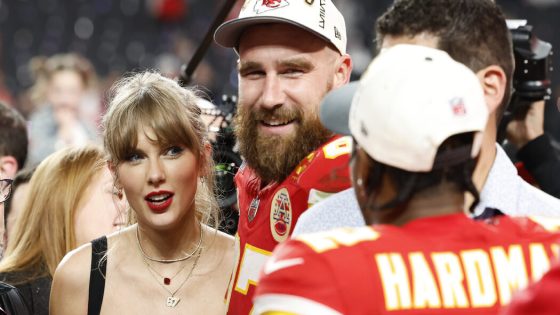The N.F.L. scores big
In many ways, the N.F.L. couldn’t have asked for a better outcome for the Super Bowl. It got a thrilling overtime victory that cemented the Kansas City Chiefs as the league’s latest dynasty; a well-reviewed halftime show by Usher; a full roster of pricey ads; and, of course, Taylor Swift in person.
It was a powerful reminder of the Super Bowl’s singular perch in America’s cultural landscape, and how that can translate into billions for a juggernaut sports league.
The game was a place to see and be seen. Yes, Swift arrived in time from Japan to cheer on her boyfriend, the Chiefs star Travis Kelce. And A-list celebrities like Jay-Z, Beyoncé and LeBron James were spotted at Allegiant Stadium in Las Vegas.
Also in attendance were corporate moguls including Elon Musk — who touted a surge in activity on his X social network during the game — Tim Cook of Apple and the Twitter and Block co-founder Jack Dorsey, who was wearing a crypto in-joke T-shirt.
The game could set a record. The broadcast, perhaps aided by an army of Swift fans, may surpass the 115 million viewers who tuned in last year, making that the most-watched show in U.S. history. (Viewership for N.F.L. games has rebounded strongly in recent years; the A.F.C. and N.F.C. championship matches on Jan. 28 accounted for nearly 39 percent of national linear TV viewing.)
That would help explain why advertisers were still willing to fork over $7 million for a 30-second spot during last night’s broadcast. (More on the ads later.) “In this era of fragmentation, the Super Bowl is what television used to be,” Brad Adgate, a veteran media analyst, told The Times.
The N.F.L. may also profit from its growing ties to sports betting. Wagers were expected to surpass $23 billion. Not all of that was necessarily legal, but the level of interest may validate the league’s interest in gambling, which has yielded lucrative sponsorships with betting companies and, more important, increased engagement from sports fans.
All this bodes well for the league’s future. The N.F.L. already stands to collect more than $125 billion from selling broadcast rights to its games over the next decade. Strong viewership numbers is enabling the league to parcel out games to streaming giants for eye-wateringly high prices.
That success is pushing up valuations of N.F.L. franchises to record levels, and as DealBook reported this weekend will be high on the agenda at next month’s owners meeting to discuss allowing institutions to buy into teams.
About the ads: Which were the most-talked about? Contenders included the actor Michael Cera’s absurdist CeraVe spot, Beyoncé’s stealth album announcement in a pitch for Verizon and the latest Ben Affleck appearance for Dunkin’ (with Matt Damon, Jennifer Lopez and Tom Brady — who also popped up in a BetMGM ad).
But one much-discussed ad, for Cetaphil lotion, has drawn criticism after a social media influencer said the premise was stolen from her.
HERE’S WHAT’S HAPPENING
Donald Trump revives worries about his commitment to NATO. European leaders warned about the geopolitical risks of a second Trump term after the former president said this weekend that he would not defend some NATO members against an attack from Russia. But some hawkish Republicans, including the senators Lindsey Graham and Marco Rubio, refused to criticize Trump.
An aid bill for Israel and Ukraine advances in the Senate. The emergency funding measure, which would send $60 billion to Kyiv and $14 billion to Jerusalem, easily cleared a critical hurdle on Sunday that could see the full chamber passing it soon. But the bill faces longer odds in the Republican-controlled House.
Israel fires back after Moody’s downgrade. The credit ratings agency cut its sovereign rating for Israel because of concerns about the war in Gaza and the weakening of the country’s “executive and legislative institutions.” Israeli officials, including Prime Minister Benjamin Netanyahu, responded during the weekend that Israel’s economy would bounce back “the moment we win the war.” Stocks in Tel Aviv rose on Monday.
Tallying the latest wave of tech layoffs. Companies including Microsoft, eBay and Snap have cut 34,000 jobs since the start of the year, as they refocus efforts on building products around generative A.I., The Financial Times reports, citing data from Layoffs.fyi. One analyst signaled that the layoffs have only just begun.
A critic blitzes Tesla
Shareholders in Tesla have had it rough lately, with the carmaker’s stock down amid worries about the electric vehicle market and a flurry of unflattering headlines about Elon Musk.
Then more bad news arrived during the Super Bowl on Sunday.
A deep-pocketed nemesis bought ad time during the game. The Dawn Project, a nonprofit sponsored by the tech entrepreneur Dan O’Dowd, used a pair of pricey slots to call for a boycott of Tesla, part of the one-time Senate candidate’s long-running crusade.
Citing a recent investigation by The Washington Post into deaths and injuries linked to Tesla vehicles operated with Autopilot, the two ads called the self-driving technology “a reckless experiment” that has “claimed 33 lives.” (Under pressure from regulators, Tesla recalled more than two million vehicles in December following The Post’s report.)
Tesla has pushed back, sending the Dawn Project a cease-and-desist letter in response to earlier broadcast and print ads. Sunday’s spots kicked up plenty of discussion on Musk’s social media platform, X, with Tesla supporters and critics arguing about the technology. (Musk himself didn’t weigh in.)
The state of the E.V. market could be a bigger concern. Tesla, recently displaced by BYD of China as the leader in electric vehicle sales, announced this past weekend it would cut the price of its popular Model Y by $1,000. That follows a slew of discounting in Asia and Europe.
Musk played down the latest move as a temporary measure to stoke demand during winter, when sales tend to slow.
Tesla is under pressure for other reasons as well. The Wall Street Journal recently reported that some directors at Musk’s companies had complicated financial ties to Musk, and knew of his use of illicit drugs. Meanwhile, a Delaware court struck down a nearly $56 billion pay package for Musk that had been approved in 2018.
Tesla’s stock has faltered. It’s down more than 20 percent this year, the worst performance in the so-called Magnificent Seven group of stocks that has powered the S&P 500 to new highs.
Even longtime bulls are growing impatient. In a note to investors last week, Dan Ives, an analyst at Wedbush, called on the board to take control of the narrative “to stop this Category 5 hurricane over Tesla’s stock.”
The latest mega deal in the oil patch
Mergers in the fossil-fuel sector are showing no signs of cooling off, as two Permian Basin producers announced a $26 billion deal on Monday.
Diamondback Energy agreed to buy Endeavor Energy in a cash-and-stock deal. Endeavor, founded by the billionaire wildcatter Autry Stephens, had become the subject of takeover speculation in oil circles over the past several months. (According to The Wall Street Journal, ConocoPhillips also had reportedly explored a bid.)
The deal would create one of the largest shale drillers in the Permian, a stretch of land in West Texas and southeastern New Mexico that’s rich in oil and natural gas.
Fossil-fuel M.&A. is heating up amid a rise in oil prices. West Texas Intermediate, the U.S. benchmark, is up roughly 9 percent this year, driven in part by concern that war in the Middle East could constrain global supplies.
Even as Washington, Brussels and other governments promote greener energy sources, Big Oil is betting that demand for fossil fuels will remain brisk for years to come.
Bumper profit has fueled an energy merger spree, even as deal-making lags in general. The spree started in October with back-to-back blockbuster deals: Exxon Mobil’s $60 billion bid for the shale driller Pioneer Natural Resources and Chevron’s $53 billion offer for Hess.
Then in December, Occidental announced a $12 billion acquisition of CrownRock, a driller with a big presence in the Permian. And last month Chesapeake Energy agreed to buy the liquefied natural gas producer Southwestern Energy in an all-stock deal valued at $7.4 billion.
The week ahead
Stocks keep breaking records. Will new inflation data and earnings reports keep the streak going? Here’s what to watch.
Tuesday: It’s the event of the week — the Commerce Department is set to release its latest Consumer Price Index report, with economists forecasting that inflation dipped last month.
And Airbnb, Shopify, Krispy Kreme and Coca-Cola report earnings, offering fresh insights into the buying power of the consumer.
Wednesday: Economic data releases on the calendar include the Consumer Prices Index in Britain and fourth-quarter G.D.P. for the eurozone and Japan. Cisco, Sony and Occidental Petroleum plan to report results.
Thursday: Retail sales figures are scheduled for publication. Also, Airbus, DoorDash, Deere and DraftKings are set to announce earnings.
Friday: The University of Michigan will publish its latest consumer sentiment report.
THE SPEED READ
Deals
-
The cost of Disney’s fight against activist investors including Nelson Peltz could surpass $70 million, making it one of the costliest proxy battles on record. (WSJ)
-
The Italian luxury company Tod’s is going private in a sale to its founding family and the LVMH-backed investment firm L Catterton that values it at $1.5 billion. (FT)
Policy
-
Representative Mike Gallagher, the Wisconsin Republican who chairs a House committee overseeing U.S. efforts to compete with China, isn’t running for re-election. (WSJ)
-
How the departure of a top official at the Federal Energy Regulatory Commission threatens the Biden administration’s climate plans. (Politico)
Best of the rest
We’d like your feedback! Please email thoughts and suggestions to [email protected].
Source Agencies



